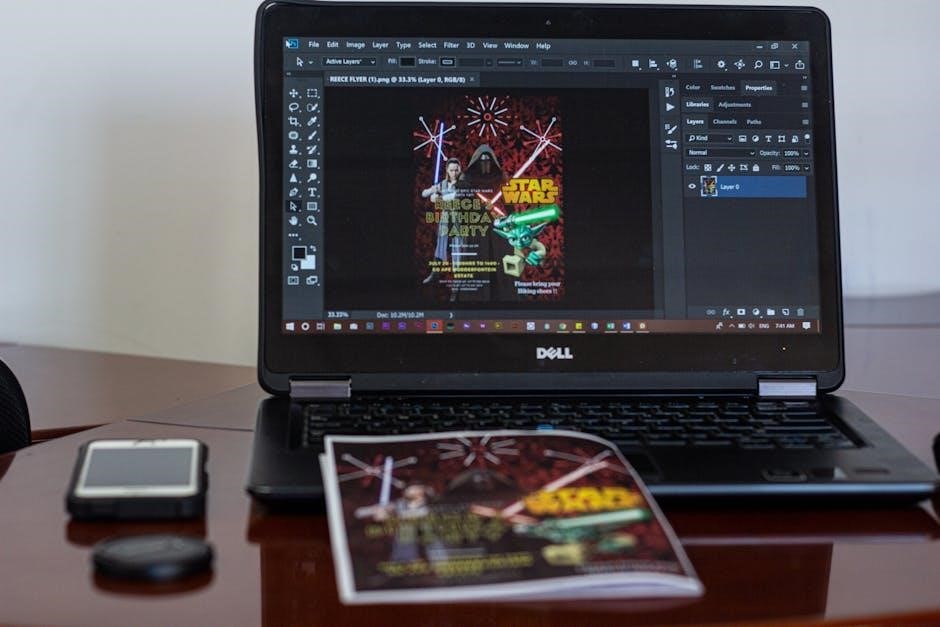This document explores philosophical‚ scientific‚ and cultural themes‚ encouraging critical thinking and analysis through thought-provoking questions. It blends French semantics with cosmic inquiries‚ inspired by Bruno Latour’s philosophical insights.
1.1 Overview of the Document’s Purpose
The “En Direct de l’Univers Questionnaire PDF” aims to explore philosophical‚ scientific‚ and cultural themes through a series of thought-provoking questions. It encourages critical thinking and analysis‚ blending French semantics with cosmic inquiries. The document’s purpose is to stimulate reflection on complex ideas‚ drawing inspiration from Bruno Latour’s philosophical perspectives and the exploration of the universe’s structure. Its design fosters intellectual engagement and deeper understanding of interconnected concepts.
1.2 Relevance of the Topic in Modern Context
The “En Direct de l’Univers Questionnaire PDF” addresses contemporary issues by linking philosophy‚ science‚ and culture. Its focus on critical thinking resonates in today’s information-rich world‚ where analytical skills are essential. The document’s exploration of cosmic and ethical questions aligns with current scientific debates‚ making it a relevant resource for modern scholars and thinkers seeking interdisciplinary insights.
Philosophical Perspectives in the Questionnaire
The document explores existential and epistemological questions‚ influenced by Bruno Latour’s theories‚ prompting readers to reflect on reality‚ knowledge‚ and human existence through a critical lens.
2.1 Bruno Latour’s Influence on the Document
Bruno Latour’s philosophical framework significantly shapes the questionnaire‚ emphasizing the interconnectedness of human and non-human actors. His theories on agency‚ networks‚ and the construction of reality inspire the document’s exploration of knowledge systems. Latour’s approach encourages readers to question traditional dichotomies‚ fostering a deeper understanding of the universe and human perception through a critical‚ interdisciplinary lens.
2.2 Key Philosophical Questions Addressed
The questionnaire delves into fundamental philosophical inquiries‚ such as the nature of existence‚ knowledge‚ and reality. It challenges readers to reflect on their understanding of the universe‚ encouraging critical engagement with concepts like agency‚ causality‚ and perception. These questions‚ inspired by contemporary philosophical debates‚ prompt readers to explore their beliefs and assumptions about the world and its complexities.
The Importance of Critical Thinking in the Questionnaire
The questionnaire emphasizes analytical reasoning‚ prompting readers to reflect on their assumptions and explore complex ideas thoroughly‚ enhancing their ability to think deeply and critically.
3.1 How the Document Encourages Analytical Reasoning
The document prompts readers to evaluate evidence‚ question assumptions‚ and form well-supported conclusions. By posing open-ended questions‚ it fosters a deeper engagement with the subject matter‚ encouraging readers to think logically and systematically about complex ideas and their implications.
3.2 Examples of Thought-Provoking Questions
The document includes questions like‚ “What is the nature of reality?” and “How do perceptions shape understanding?” These inquiries encourage readers to reflect deeply‚ analyze concepts critically‚ and explore diverse perspectives‚ fostering a mindset of curiosity and intellectual exploration. Such questions are designed to stimulate meaningful discussion and deeper comprehension of complex topics.

Language and Semantics in the Questionnaire
The document uses French‚ emphasizing semantic richness and philosophical depth. Synonyms like “conceive” and “envisage” highlight nuanced thinking‚ reflecting Bruno Latour’s influence and encouraging reflective engagement with complex themes.
4.1 The Use of French and Its Significance
The use of French in “En Direct de l’Univers Questionnaire PDF” highlights linguistic nuances and cultural depth. It reflects the document’s philosophical underpinnings‚ aligning with Bruno Latour’s intellectual legacy. French enriches the exploration of complex ideas‚ emphasizing semantic precision and fostering deeper engagement. This choice underscores the document’s academic intentions and appeal‚ enhancing its intellectual and cultural resonance.
4.2 Synonyms and Related Terms for “Think”
Synonyms for “think” include conceive‚ envisage‚ envision‚ fancy‚ imagine‚ and realize. These terms convey the act of forming ideas or opinions‚ each with unique connotations. “Conceive” implies creation‚ while “envisage” suggests planning. “Imagine” and “envision” emphasize mental visualization. “Realize” implies understanding through experience. These variations enrich the document’s exploration‚ offering nuanced perspectives on cognition and intellectual processes.

Scientific and Astronomical References
The document delves into cosmic phenomena‚ exploring concepts like cosmic inflation and the universe’s structure. It ties scientific theories to astronomical observations‚ offering an interdisciplinary exploration of the cosmos.
5.1 The Role of Cosmic Inflation in the Document
Cosmic inflation is central to the document‚ framing the universe’s origins as a rapidly expanding entity. It questions how inflation shapes our understanding of space-time and matter formation‚ linking theoretical physics to existential inquiries about the cosmos and humanity’s place within it‚ fostering a deeper exploration of astronomical and philosophical concepts.
5.2 How the Universe’s Structure is Questioned
The document delves into the universe’s structure by questioning its fundamental nature‚ from the distribution of matter to the intricacies of space-time. It challenges readers to consider how cosmic phenomena‚ such as inflation‚ shape our understanding of reality‚ encouraging a deeper exploration of astronomical and philosophical concepts that redefine humanity’s place within the cosmos.

Academic and Research Implications
The document’s interdisciplinary approach fosters scholarly discussions‚ offering insights into cosmic inflation and philosophical inquiries. Its citations and innovative questions inspire further academic exploration and research.
6.1 Citations and References in the PDF
The PDF cites influential thinkers like Bruno Latour and Max Tegmark‚ blending philosophy with scientific inquiry. It references historical sources and contemporary research‚ encouraging a critical approach to understanding cosmic phenomena and human perception. The document’s diverse citations reflect its interdisciplinary nature‚ fostering a rich academic dialogue and promoting deeper exploration of its themes.
6.2 Contribution to Scholarly Discussions
The “En Direct de l’Univers Questionnaire PDF” enriches scholarly discourse by bridging philosophy‚ science‚ and culture. Its thought-provoking questions challenge existing frameworks‚ fostering critical thinking and interdisciplinary dialogue. By referencing influential thinkers like Bruno Latour‚ the document encourages researchers to explore new perspectives‚ making it a valuable resource for academic exploration and future studies in various fields.

Cultural and Symbolic Elements
The document incorporates cultural symbols and narratives‚ reflecting broader societal values and intellectual traditions. Its use of French emphasizes cultural depth‚ inviting readers to interpret and reflect.
7.1 Symbolism in the Document’s Narrative
The document uses symbolism to convey deeper meanings‚ with metaphors and cultural references enriching its narrative. Symbols like cosmic inflation and philosophical reflections represent broader intellectual and societal themes‚ inviting readers to explore connections between abstract concepts and real-world implications.
7.2 Cultural Contexts and Interpretations
The document’s narrative is deeply rooted in cultural contexts‚ with interpretations shaped by philosophical and scientific discussions. The use of French highlights linguistic diversity‚ while its exploration of universal themes appeals to a broad audience. Cultural symbols and references encourage readers to reflect on societal norms and intellectual traditions.

Practical Applications of the Questionnaire
The questionnaire offers practical tools for education‚ fostering critical thinking and analytical skills. Its real-world implications make it a valuable resource for both academic and non-academic settings.
8.1 How to Use the PDF for Educational Purposes
Educators can integrate the questionnaire into curriculum by using its questions as discussion starters or homework assignments. It encourages critical thinking and analytical skills‚ making it ideal for philosophy‚ science‚ or cultural studies classes. The document’s structure also provides a framework for debates‚ fostering deeper understanding of complex topics. Its versatility allows adaptation to various educational levels‚ enhancing student engagement and intellectual growth effectively.
8.2 Real-World Implications of the Questions
The questions in the PDF encourage deeper thinking about societal‚ ethical‚ and scientific issues‚ making them relevant for real-world applications. They promote critical reasoning‚ which is essential in decision-making and problem-solving. By addressing topics like cosmic inflation and philosophical inquiry‚ the document fosters a mindset that can be applied to understanding complex global challenges and fostering innovative solutions across various fields and industries.
The Role of Digital Accessibility
The PDF format enhances global accessibility‚ allowing easy sharing and access to the questionnaire across devices‚ fostering engagement with its philosophical and scientific inquiries worldwide.
9.1 The Significance of PDF Format
The PDF format ensures universal compatibility and preserves the document’s layout‚ making it accessible across devices. It maintains clarity and structure‚ crucial for the questionnaire’s complex philosophical and scientific content. The format also supports easy sharing and downloading‚ enhancing its reach and engagement with a global audience interested in exploring cosmic and existential inquiries.
9.2 How to Locate and Download the Document
To locate the PDF‚ users can search using specific terms like “En Direct de l’Univers Questionnaire PDF” on academic platforms or institutional repositories. Ensure the source is reputable for authenticity. Once found‚ downloading typically involves clicking a “Download” button or following site-specific instructions. This accessibility facilitates easy access to the document’s insightful content for global readers.

Case Studies and Examples
The document features case studies like cosmic inflation and references works by authors such as Max Tegmark‚ illustrating key concepts through real-world scientific and philosophical examples.
10.1 Historical Sources and Their Analysis
The document critically analyzes historical sources‚ including works by Bruno Latour and Max Tegmark‚ exploring their philosophical and scientific contributions. These sources provide insights into cosmic phenomena and theoretical frameworks‚ influencing contemporary discussions on the universe’s structure and human understanding. The analysis bridges past ideas with modern inquiries‚ enriching the questionnaire’s depth and relevance.
10.2 Practical Examples from the Document
The document provides practical examples‚ such as discussions on cosmic phenomena and theoretical physics‚ to illustrate key concepts. It includes case studies on learning strategies and critical thinking‚ offering real-world applications of the ideas explored. These examples enhance understanding and encourage readers to engage deeply with the topics presented‚ making the document a valuable resource for both education and personal reflection.

Ethical and Moral Considerations
The document raises ethical questions about knowledge‚ perception‚ and decision-making‚ encouraging readers to reflect on moral implications. It explores how ideas shape actions‚ emphasizing critical thought and responsibility.
11.1 Ethical Questions Raised in the PDF
The PDF delves into ethical concerns regarding truth perception and decision-making‚ urging readers to evaluate how their beliefs influence actions. It questions the moral responsibilities tied to knowledge and understanding‚ prompting a deeper reflection on personal and societal ethics. The document challenges readers to consider the ethical implications of their thoughts and choices‚ fostering a mindful approach to critical thinking.
11.2 Moral Implications of the Topics Discussed
The document raises profound moral implications‚ particularly regarding humanity’s responsibility in understanding cosmic phenomena and ethical decision-making. It questions the balance between knowledge and responsibility‚ urging readers to reflect on the moral dimensions of their beliefs and actions. The PDF also explores how cultural narratives shape moral values‚ emphasizing the need for ethical clarity in a complex universe;

The document concludes by summarizing its exploration of philosophical and scientific themes‚ emphasizing the importance of critical thinking. It highlights Bruno Latour’s influence and suggests future interdisciplinary research directions.
12.1 Summary of Key Takeaways
The document synthesizes philosophical‚ scientific‚ and cultural inquiries‚ emphasizing critical thinking and analytical reasoning. It explores cosmic inflation‚ universal structure‚ and Bruno Latour’s influence‚ while encouraging interdisciplinary dialogue. The PDF’s thought-provoking questions and French semantics highlight its unique approach‚ making it a valuable resource for both academic and broader audiences seeking deeper understanding of complex themes.

12.2 Potential Areas for Further Exploration
Future research could delve deeper into the philosophical underpinnings of cosmic inflation and its implications for understanding the universe. Exploring the integration of Latour’s theories with emerging scientific discoveries could offer new insights. Additionally‚ examining the cultural symbolism and its global interpretations may uncover fresh perspectives‚ while expanding the document’s educational applications could enhance its scholarly impact and accessibility.
